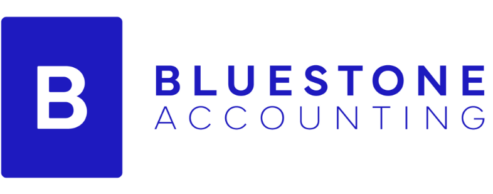6 Key Points on Business Startups
A new Business Startup is both an exciting and daunting prospect. It involves venturing into a new space and carries with it the buzz and thrill of starting on your new path towards business success and no doubt financial freedom. It starts with a dream, an ambition; it starts with the end in mind. Do not wait for the perfect time to start a business, the first step is to start now.
At Bluestone Accounting, it is our pleasure to work with new startups. Partnering with an experienced accountant will help to get your business off the ground quickly and on the right track. So, we have put together a guide to help you transform your business dreams into a business reality.
Key Point 1: The Idea
It all starts with an idea for a product or a service. You spotted a demand for this product or service; you have identified the target market. Behind the idea is motivation. It is your reason for wanting to go for it. Understanding your motivation is as important as the idea itself. I would suggest that you write down what your motivational factors and goals are. Ensure these are somewhere visible to you.
- Work / Life Balance
- More time with the family
- Frustrated with corporate environment
- To be your own boss
- To provide a better-quality product or service than what is currently available
Whatever your reasons might be, understand them, as they are your motivating factors.
Born from motivation, is the idea. This is the idea that will generate into a product or service that will be core to your business. Your first step is to test your idea, and this involves carrying out some marketing research to validate your idea. This is called a feasibility study.
Key Point 2: Feasibility Study
Now that you have an idea, it’s time to turn your idea into your product and services. This involves conducting research to identify key features such as your product, your business, your branding, looking at your competitors, but most importantly identifying what it is and why your product or service provides adds a greater value proposition than that of your competitors. It is the reason why a customer will choose your product over your competitor. This can be price, quality, customer service, delivery, new technology, or greater expertise to name but a few. Take this time to truly define your product or service. Define who your ideal customer is. A feasibility study also provides an opportunity to develop a marketing plan.
Your marketing plan will cover many areas; what your branding will look like while communicating to your customers how your product or service will be promoted, where they are located, and how you will reach out to them. A Marketing Plan does not need to be a 10-page essay. A 1-page marketing plan will suffice for starting out. Outlining the 4 P’s – Price / Product / Place / Promotion. Marketing is not an exact science and your marketing strategy will change and develop over time as you pivot and tilt until you find what works for you. Bear in mind that as your business grows and evolves, so too will your marketing plan.
Key Point 3: Setting up your Business
In Ireland, there are two common types of business structures we are familiar with: Sole Traders and Limited Companies. Each has its pros and cons, and which is best for you will depend on a number of factors.
Sole Trader:
The quick and simplest way to start your business. You will operate as yourself, and it is quite common to use part or all your name in your business name. Many others choose to create a Business Name and register this Business Name with the CRO. Operating as a Sole Trader means that there is less administration to be completed each year compared to a Limited Company.
There are some disadvantages to operating as a Sole Trader:
- Your personal assets are not protected from creditor liabilities.
- All profits are treated as income and therefore can be taxed at the higher Income Tax rate of 40%. Profits in a Limited Company are taxed at 12.5%.
- Some initiatives are not available to sole traders, that are available for Limited Companies, such as the option for a company to contribute to the directors’ pension scheme.
- Not able to avail of tax-free small benefit exemption of €500 per year.
Limited Company:
Setting up a Limited Company in Ireland is much quicker now than it used to be. In fact, you can have a Limited Company registered within several working days with the CRO. A Limited Company is owned by shareholders and due to recent changes in Company Law, a Limited Company can now have a Single Member Shareholder. All Limited Companies must have at least 1 Director and 1 Secretary.
There are several advantages to operating as a Limited Company:
- Personal assets are protected from creditors.
- Profits are taxed at 12.5%.
- Directors can have the company contribute to a pension scheme.
- Can be easier to avail of financial funding and supplier credit.
- Longer-term tax planning opportunities available.
There are also disadvantages:
- Increased annual administration, including the preparation of year-end accounts and annual returns to the CRO and with it the additional costs.
- There is increased responsibility on both the Director and Company Secretary to meet the requirements of maintaining compliance with the Companies Act.
- Registering a Limited Company remains the most popular option by far for new Startups.
We have put together a comprehensive guide to Sole Trader vs. Company Structures.
Key Point 4: Registering for Tax with Revenue Commissioners
Once you have set up a Limited Company registered with the CRO or you have skipped this option and proceeded with the Sole Trader option, it’s time to register with the Revenue Commissioners for Corporation Tax as well as VAT and PAYE (if applicable).
Sole Traders will need to register for Income Tax and you will maintain your existing PPS Number as your tax reference.
Limited Companies will need to register for Corporation Tax and will receive its own Tax Registration number.
Key Point 5: Open a Bank Account
Once you have set up your business or company and registered with the Revenue Commissioners for tax purposes, your next step is to open a business or company bank account.
There are several areas to consider when doing this, as in most cases the default option for new business owners is to approach their current bank that they do their personal banking with. This is not necessarily the best option and it is worth exploring what the retail and online banks have to offer for your business. See our guide on Selecting the Right Bank for your Business.
Here are some of the main points to consider when selecting a bank for your new business:
- What fees are charged monthly/quarterly / per transaction?
- Do they offer free banking?
- Is their online banking able to integrate with accounting software?
- Will you have a dedicated account manager?
- What types of startup funding are available, such as overdrafts, credit cards, working capital loans, and leasing?
- How easy is it to access their facilities, both their on-street premises and online platforms?
Key Point 6: Forecasting and Planning
Begin with the end in mind.
Having a goal to aim for will mean that you are already on the road to success. Which road is the correct road to take will only be discovered along the way as you engage in different strategies to achieve your business goals. Leaning on the experience of business coaches or mentors, such as those at Bluestone Accounting, can assist in steering you and your business in the right direction. Preparing forecasts for your sales and budgets for your expenditures will provide you with the reference points of how your business should be performing based on your expectations. By developing a financial forecast, it will give you the expected monetary output of your combined use of resources and operations.
Comparing your financial results to these forecasts will allow you to make decisions along the way to correct and alter the current strategy or change it up for a different approach.
Having up-to-date financial data is vital to the success of all businesses. I recommend that at a minimum your bookkeeping is done monthly with your business performance reviewed quarterly. Sales Invoicing ideally should be done immediately, and your banking and supplier invoices should be processed weekly. After all, if you do not know what you are owed, what you owe, and to whom, how will you know if you are under-performing and need to make the changes required?
Start
You’re off but you are not alone.
Starting your own business can sometimes be overwhelming as there are many fronts to be managed simultaneously. Working with an experienced team like that at Bluestone Accounting can provide you with the guidance you require and steer you in the right direction to get your business off the ground.
We can assist you with carrying feasibility studies, marketing concepts such as digital marketing, company formations and sole trader registrations, to goal setting and financial planning.


